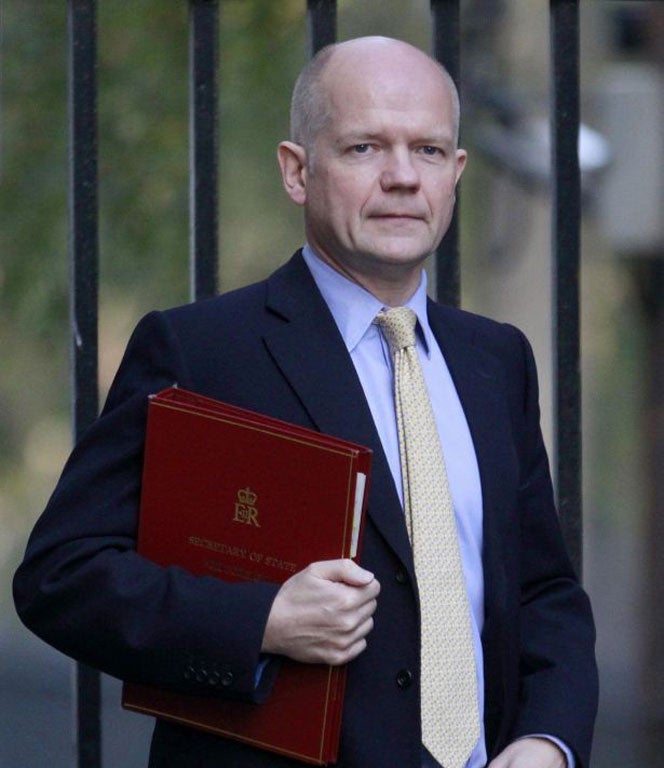Hague seeks to 'draw line' under torture allegations

Your support helps us to tell the story
From reproductive rights to climate change to Big Tech, The Independent is on the ground when the story is developing. Whether it's investigating the financials of Elon Musk's pro-Trump PAC or producing our latest documentary, 'The A Word', which shines a light on the American women fighting for reproductive rights, we know how important it is to parse out the facts from the messaging.
At such a critical moment in US history, we need reporters on the ground. Your donation allows us to keep sending journalists to speak to both sides of the story.
The Independent is trusted by Americans across the entire political spectrum. And unlike many other quality news outlets, we choose not to lock Americans out of our reporting and analysis with paywalls. We believe quality journalism should be available to everyone, paid for by those who can afford it.
Your support makes all the difference.Foreign Secretary William Hague will today stress the Government's commitment to "drawing a line" under the alleged involvement of Britain's intelligence agencies in the torture of terror suspects held overseas.
In a rare speech on the use of secret intelligence, Mr Hague will praise the agencies as "vital assets" which protect lives and make a "critical contribution" to safeguarding UK national interests.
He will, however, acknowledge that Britain's reputation had been damaged by a series of claims that MI5 and MI6 officers had been complicit in the extraordinary rendition of terror suspects leading to their detention and torture overseas.
"The very making of these allegations undermined Britain's standing in the world as a country that upholds international law and abhors torture," he will say, according to advance extracts of his speech.
"As a Government we understand how important it is that we not only uphold our values and international law, but that we are seen to do so."
Mr Hague will point to the establishment of the detainee inquiry under Sir Peter Gibson and the recent green paper proposals to enable the greater use of secret intelligence material in court cases as evidence of the Government's commitment to tackle the issue.
"We are confident that taken together these changes represent the most comprehensive effort yet to address the complex issues thrown up by the need to protect our security in the 21st century, and to do so in a way that upholds our values and begins to restore public confidence," he will say.
"So this will be our Government's approach: drawing a line under the past, creating the right legislative framework so that the interests of national security and justice are reconciled, and drawing on the talents and capabilities of the intelligence agencies to support foreign policy and our national security."
Both approaches have been controversial. Lawyers representing detainees have said they will boycott the Gibson inquiry complaining the hearings will largely be secret and it will not seek evidence from other countries involved.
The green paper has been criticised by human rights groups who have warned that it will lead to greater secrecy in the justice system, making it more difficult to hold the authorities to account for alleged abuses.
Mr Hague - who is responsible for the Secret Intelligence Service, MI6 and GCHQ, the electronic "listening" agency - will acknowledge that the operation of the agencies throws up difficult ethical dilemmas.
He will say that each year he sees hundreds of operational proposals from the agencies, not all of which he approves.
"Intelligence throws up some of the most difficult ethical and legal questions that I encounter as Foreign Secretary, and that my predecessors in this position also have had to grapple with," he will say.
However, used correctly, he will say, the agencies make an essential contribution to maintaining Britain's national security.
"Properly used, secret intelligence saves both military and civilian lives, protects our economy, stops serious crime and makes a critical contribution to our diplomatic and military success," he will say.
"We use our intelligence agencies for specific needs which only they in Government are equipped to address; such as countering particular forms of crime, terrorism or state espionage.
"They provide an early warning system against states which take actions which are hostile to us or to our interests.
"Without our agencies, terrorist groups would have free rein to harm UK citizens here and abroad."
PA
Join our commenting forum
Join thought-provoking conversations, follow other Independent readers and see their replies
Comments